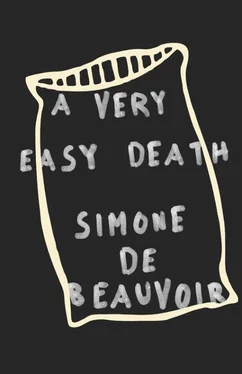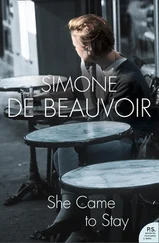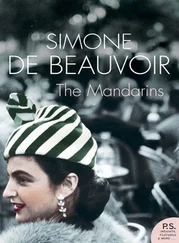Simone de Beauvoir - A Very Easy Death
Здесь есть возможность читать онлайн «Simone de Beauvoir - A Very Easy Death» весь текст электронной книги совершенно бесплатно (целиком полную версию без сокращений). В некоторых случаях можно слушать аудио, скачать через торрент в формате fb2 и присутствует краткое содержание. Город: New York, Год выпуска: 2012, ISBN: 2012, Издательство: Pantheon Books, Жанр: Биографии и Мемуары, на английском языке. Описание произведения, (предисловие) а так же отзывы посетителей доступны на портале библиотеки ЛибКат.
- Название:A Very Easy Death
- Автор:
- Издательство:Pantheon Books
- Жанр:
- Год:2012
- Город:New York
- ISBN:978-0-307-83219-1
- Рейтинг книги:4 / 5. Голосов: 1
-
Избранное:Добавить в избранное
- Отзывы:
-
Ваша оценка:
- 80
- 1
- 2
- 3
- 4
- 5
A Very Easy Death: краткое содержание, описание и аннотация
Предлагаем к чтению аннотацию, описание, краткое содержание или предисловие (зависит от того, что написал сам автор книги «A Very Easy Death»). Если вы не нашли необходимую информацию о книге — напишите в комментариях, мы постараемся отыскать её.
The Sunday Telegraph
Powerful, touching, and sometimes shocking, this is an end-of-life account that no reader is likely to forget.
A Very Easy Death — читать онлайн бесплатно полную книгу (весь текст) целиком
Ниже представлен текст книги, разбитый по страницам. Система сохранения места последней прочитанной страницы, позволяет с удобством читать онлайн бесплатно книгу «A Very Easy Death», без необходимости каждый раз заново искать на чём Вы остановились. Поставьте закладку, и сможете в любой момент перейти на страницу, на которой закончили чтение.
Интервал:
Закладка:
Her love for us was deep as well as exclusive, and the pain it caused us as we submitted to it was a reflection of her own conflicts. She was very open to wounds – she was capable of chewing over a reproof or a criticism for thirty or forty years – and her diffused indwelling resentment made itself apparent in aggressive forms of behaviour – brutal frankness, heavily ironic remarks. With regard to us, she often displayed a cruel unkindness that was more thoughtless than sadistic: her desire was not to cause us unhappiness but to prove her own power to herself. When I was spending my holidays with Zaza, my sister wrote to me: an adolescent girl, she told me about her heart, her soul, her problems; I replied. Maman opened my letter and read it aloud in front of Poupette, shrieking with laughter at its confidences. Poupette, stiff with fury, overwhelmed her with her scorn and swore that she would never forgive her. Maman burst into tears and begged me, in a letter, to bring them together again: which I did.
She wanted to make sure of her power over my sister above all, and she grew jealous of our friendship. When she knew that I had lost my faith she said very loudly and angrily to Poupette, ‘I shall defend you against her influence. I shall protect you!’ During the holidays she forbade us to see one another alone: we met secretly in the chestnut woods. This jealousy tormented her all her life, and until the end we still kept the habit of hiding most of our meetings from her.
But it also often happened that we were moved by the warmth of her affection. When Poupette was about seventeen she was the involuntary cause of a quarrel between Papa and ‘Uncle’ Adrien, whom he considered his best friend: Maman defended her fiercely against my father, who would not speak to his daughter for months. Later on he held it against my sister that she would not sacrifice her vocation as a painter in order to earn her bread and butter, and that she went on living at home: he would not give her a penny and he barely fed her. Maman stood up for her and used all her ingenuity to help her. For my part, I have not forgotten how sweetly, after my father’s death, she urged me to go off on a journey with a friend, when a single sigh from her would have kept me back.
She spoilt her relationships with other people by clumsiness: nothing could have been more pitiful than her attempts at separating my sister and me. When our cousin Jacques – she transferred to him a little of the love she had had for his father – took to coming to the rue de Rennes less frequently she received him every time with little scenes that she thought amusing and that he found irritating: he came less and less often. There were tears in her eyes when I settled in Grandmama’s house, and I was grateful to her for not making even the first hint of an emotional display – that was something she always avoided. Yet every time I had dinner at home that year she grumbled that I was neglecting my family, although in fact I came very often. She would not ask for anything, out of pride and upon principle; and then she complained of not being given enough.
She could not discuss her difficulties with anyone at all, not even herself. She had not been taught to see her own motives plainly nor to use her own judgment. She had to take shelter behind authority: but the authorities she respected were not in agreement; there was hardly a single point in common between the Mother Superior of Les Oiseaux and my father. I had experienced this setting of one idea against another while my mind was being formed and not after it was set: thanks to my early childhood I had a confidence in myself that my mother did not possess in the least: the road of argument, disputation – my road – was closed to her. On the contrary, she had made up her mind to share the general opinion: the last person who spoke to her was right. She read a great deal; but although she had an excellent memory she forgot almost everything. Exact knowledge, a decided view, would have made the sudden reversals that circumstances might force upon her impossible. Even after my father’s death she retained this prudent attitude. The people she then mixed with were more of her way of thinking. She sided with the ‘enlightened’ Catholics against the integrists. Yet the people she knew differed on many points. And on the other hand, although I was living in sin, my opinion counted in many things, and so did those of my sister and Lionel. She dreaded ‘looking a fool’ in our eyes. So she remained woolly-minded and she went on saying yes to everything and being surprised by nothing. In her last years she did attain some kind of coherence in her ideas, but at the time when her emotional life was at its most tormented she possessed no doctrine, no concepts, no words with which to rationalize her situation. That was the source of her bewildered uneasiness.
Thinking against oneself often bears fruit; but with my mother it was another question again – she lived against herself. She had appetites in plenty: she spent all her strength in repressing them and she underwent this denial in anger. In her childhood her body, her heart and her mind had been squeezed into an armour of principles and prohibitions. She had been taught to pull the laces hard and tight herself. A full-blooded, spirited woman lived on inside her, but a stranger to herself, deformed and mutilated.
-
As SOON AS I woke up, I telephoned my sister. Maman had come to in the middle of the night; she knew that she had been operated upon and she hardly seemed at all surprised. I took a cab. The same journey, the same warm blue autumn, the same nursing-home. But I was stepping into another story: instead of a convalescence, a deathbed. Before, I came here to spend comparatively unemotional hours; I went through the hall without paying attention. It was behind those closed doors that the tragedies were taking place: nothing showed through. From now on one of these dramas belonged to me. I went up the stairs as quickly as I could, as slowly as I could. Now there was a sign hanging on the door: No Visitors. The scene had changed. The bed was in the position it had been the day before, with both sides free. The sweets had been put away in cupboards; so had the books. There were no flowers any more on the big table in the corner, but bottles, balloon-flasks, test-tubes. Maman was asleep: she no longer had the tube in her nose and it was less painful to look at her, but, under the bed, one could see jars and pipes that communicated with her stomach and her intestines. Her left arm was attached to an intravenous drip. She was no longer wearing any clothes whatever: the bed-jacket was spread over her chest and her naked shoulders. A new character had made her appearance – a private nurse, Mademoiselle Leblon, as gracious as an Ingres portrait. She had a blue headdress to cover her hair and white padded slippers on her feet: she supervised the drip and shook the flask to dilute its plasma. My sister told me that according to the doctors a respite of some weeks or even of some months was not impossible. She had said to Professor B ‘But what shall we say to Maman when the disease starts again, in another place?’. ‘Don’t worry about that. We shall find something to say. We always do. And the patient always believes it.’
In the afternoon Maman had her eyes open: she spoke so that one could hardly make out what she said, but sensibly. ‘Well,’ I said to her, ‘so you break your leg and they go and operate on you for appendicitis!’
She raised one finger and, with a certain pride, whispered, ‘Not appendicitis. Pe-ri-ton-it-is.’ She added. ‘What luck … be here.’
‘You are glad that I am here?’
‘No. Me.’ Peritonitis: and her being in this clinic had saved her! The betrayal was beginning. ‘Glad not to have that tube. So glad!’
Читать дальшеИнтервал:
Закладка:
Похожие книги на «A Very Easy Death»
Представляем Вашему вниманию похожие книги на «A Very Easy Death» списком для выбора. Мы отобрали схожую по названию и смыслу литературу в надежде предоставить читателям больше вариантов отыскать новые, интересные, ещё непрочитанные произведения.
Обсуждение, отзывы о книге «A Very Easy Death» и просто собственные мнения читателей. Оставьте ваши комментарии, напишите, что Вы думаете о произведении, его смысле или главных героях. Укажите что конкретно понравилось, а что нет, и почему Вы так считаете.












